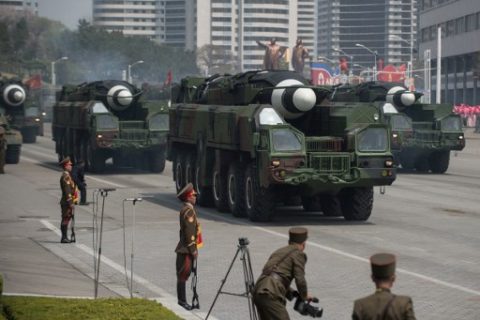
by Carole Landry
Agence France Presse
UNITED NATIONS, United States (AFP) — The United Nations Security Council met behind closed doors on Tuesday to discuss tightening sanctions on North Korea after it fired its latest ballistic missile.
United States Ambassador Nikki Haley said the US was working with China, Pyongyang’s main ally, on a new sanctions resolution and warned that all countries must step up action against North Korea or face measures themselves.
“We all have to send a sign to North Korea, and that is ‘No more. This is not play time. This is serious. These threats are not welcome’,” Haley told reporters ahead of the meeting.
“If you are a country that is supplying or supporting North Korea, we will call you out on it,” Haley said.
“We will make sure that everyone knows who you are and we will target those sanctions towards you as well.”
Despite the push for a tougher stance, Haley held out the prospect of direct talks with North Korea, saying “we are willing to talk but not until we see a total stop of the nuclear process and of any test there.”
North Korea launched Sunday what appeared to be its longest-range ballistic missile yet, saying it was capable of carrying a “heavy nuclear warhead” in a test aimed at bringing the US mainland within reach.
The US, Japan and South Korea called the emergency meeting to press international demands that North Korea change course and dismantle its missile and nuclear programs.
No draft resolution was circulated to the full council, but Haley said the US was working with China on a text.
“That’s what we are working on now. We don’t have it done yet,” Haley said.
“Absolutely, sanctions (are) something that we are looking at and we are going to continue to see where that takes us.”
During the closed-door meeting however, China made no mention of a new sanctions resolution and renewed its appeal for talks to de-escalate tensions on the Korean peninsula, according to diplomats.
Sanctions a way to go
Addressing reporters after the meeting, the council president, Uruguay’s Ambassador Elbio Rosselli, said that “clearly sanctions are a way to go” but stressed support for diplomacy to engage with Pyongyang.
North Korea has carried out two atomic tests and dozens of missile launches since the beginning of last year in its quest to develop a missile capable of delivering a nuclear warhead to the continental US.
In a unanimous statement backed by China, the council on Monday agreed to take further significant measures, including sanctions.
Among the possible measures could be an oil embargo, trade bans and targeted sanctions on North Korean individuals and companies, but these hinge on China’s willingness to apply such measures.
The Security Council adopted two sanctions resolutions last year to ramp up pressure on Pyongyang and deny leader Kim Jong-Un the hard currency needed to fund his military programs.
In all, six sets of sanctions have been imposed on North Korea since it first tested an atomic device in 2006.
Under UN resolutions, North Korea is barred from developing nuclear and missile technology.
Successful launch
In Washington, a US defense official told AFP the missile fired on Sunday appeared to be a liquid-fueled KN-17, marking what appeared to be the most successful launch of such a device.
“It’s the farthest we’ve seen one fly,” the official said, adding that military experts were assessing the missile’s re-entry capabilities.
But the Pentagon is skeptical whether Pyongyang has mastered the re-entry technology needed to ensure it survives returning into Earth’s atmosphere.
Sunday’s rocket, which Pyongyang dubbed the Hwasong-12, could prove to be a more reliable alternative to the Musudan and marks a significant milestone in its development of an ICBM that could ultimately be tipped with a nuclear warhead, experts said.
The launch represented a “significant success,” Bruce Klingner, a senior research fellow at the Heritage Foundation think tank, told AFP.
North Korea was also under scrutiny by investigators looking for the source of a major cyberattack affecting more than 150 countries, but the European police agency said it was still too early to determine who caused the chaos.







